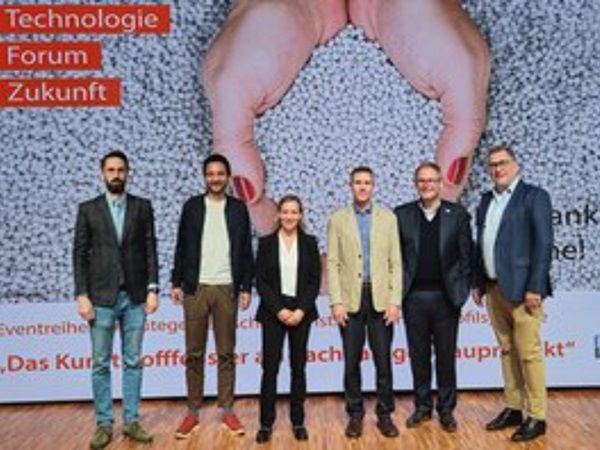
Date: 22 November 2024
Since February 2021, the RAL Gütegemeinschaft Kunststoff-Fensterprofilsysteme e.V. (GKFP) has been organizing the interactive event series "TechnologieForumZukunft". The fifth edition with the main topic "PVC windows as a sustainable building product" took place on November 7, 2024.
Five speakers emphasize the relevance of sustainability
The first part of the two-hour event consisted of five presentations by speakers with different perspectives from industry and associations. Bernhard Elias, Quality Assurance Officer at GKFP, kicked things off with "Five reasons for sustainability", which included the VinylPlus® product label, resource conservation, RAL quality assurance, eco-design in development and the circular economy.
In the second presentation, Frank Lange, Managing Director of the Verband Fenster + Fassade (VFF) and the Gütegemeinschaft Fenster, Fassaden und Haustüren e.V., presented the VFF leaflet on sustainability with an overview of the key content. He discussed legal requirements and sustainability criteria and presented building certification systems and recognized certificates in Germany.
After an intro video that briefly summarized a successful Rewindo project for recycling old windows, Moritz Underberg delved deeper into the use of recyclate. The Sustainability Manager at system manufacturer Salamander Industrie-Produkte GmbH focused on the recently published Rewindo figures for the past financial year. Thanks to a recycling volume of 136,000 tons of PVC post-consumer and post-industrial recyclables, 232,000 tons of CO2 were saved. Underberg also mentioned the municipal funding program "Climate-friendly living and working in Düsseldorf" of the city of Düsseldorf, in which our quality association supports the administration with a verification procedure. This helps window manufacturers and window buyers to select profiles that are eligible for subsidies. Finally, Underberg gave an insight into his company's sustainability strategy.
Stephan Schmidt, Managing Director of Fachverband Schloss- und Beschlagindustrie (FVS), focused on the Construction Products Regulation (CPR). He shed light on the history and the recently adopted revision of the CPR as well as its impact on our standards sector. This is because many requirement details still have to be regulated by the product standards (to be harmonized), and this under time pressure. The fact that sustainability is highly relevant in the drafting of the CPR revision becomes clear when you consider the number of times the terms are mentioned: "sustainable" is mentioned 64 times and "environment" 90 times. Schmidt concluded that "RAL quality marks must be supplemented by environmental aspects".
Jakub Mües (EPEA GmbH) looked at plastic windows from the perspective of a consulting company. 30 to 40 percent of all CO2 emissions are caused by the construction and real estate industry (construction and ongoing operation), 40 to 50 percent of raw materials are consumed in the construction industry and 60 percent of all waste is generated. Regulatory framework conditions, such as the EU Buildings Directive (EPBD) implemented by the GEG, the Ecodesign Regulation (ESPR) or the Construction Products Regulation (CPR) and the financial incentives promoted by the EU Taxonomy interlock to support circular thinking. The pressure from legislators will increase, Mües predicted. In addition, building certification with regulations such as DGNB, LEEDS, BREEAM and QNG will be introduced on a voluntary basis. Mües pointed out that certification of windows with PVC recyclate containing more than 0.1 up to 1.5 mass% lead compounds is entirely possible. Mües concluded his presentation with examples of how the active declaration of product properties helps to achieve the necessary transparency, be it through an EPD, a building resource passport or the digital product passport.
Constructive exchange between our guests
In order to deepen the different perspectives of the speakers, our experts answered questions from our moderator, Mr. Bernhard Elias, in a panel discussion. The audience also had the opportunity to determine the content of the discussion by asking questions. A short statement from Baugesellschaft Nettetal served as an introduction to the discussion. They were asked in advance to record their views on sustainable PVC windows.
The general consensus at the event was that PVC-U windows are sustainable per se. Simply because of its serviceability and its service life. The use of recyclate and the concept of recycling in general also play a significant role in this context. With regulatory solutions in the direction of design-for-recycling and design-for-repair, the industry is taking the right path.
 600450
600450










Add new comment